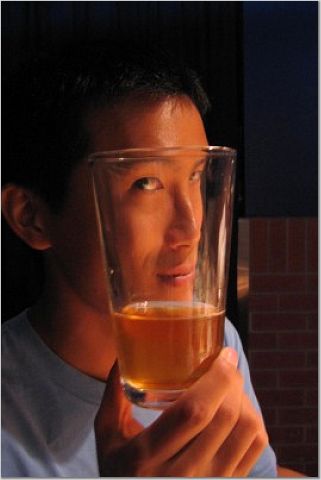I've been reading "A Table in the Presence" by USMC Chaplain Lt. Carey H. Cash recently, about his personal experiences of how his Battalion in the Gulf came to see God's unwavering protection and love. Close to the middle of the book, he speaks of relating to an Iraqi father of eight by sharing about his own three children. Rather than being the over-bearing oppressor that is often portrayed in foreign media about the US military, this book sheds light on the personal struggles that US Soldiers, sailors, and Marines face on the ground - be it family problems left unresolved, loved ones praying for the day that their warriors will return to them; and the spiritual struggles that military personnel face on the ground. Most importantly, this book illustrates the penultimate importance of placing one's trust in God first before all else - for with Him, everything else is possible.In the chapter I read, I realised the significance of calling myself a 'soldier'. I saw the meaning of what it means when God 'calls' one to a vocation...be it a doctor, lawyer, accountant, teacher...soldier. In all these vocations, one must remember that it is God who calls, not us. The ball is in our court, to respond appropriately and do his will - by serving out our terms for the betterment of society and ultimately His plan - OR choosing to do it 'our way': the selfish way of greed and corruption.Chaplain Cash emphasizes that "as military personnel they have a unique role in the world...not merely a job but a calling, a vocation". What he goes on to say is succinctly phrased in the following sentence: "While the military does not exist fo rthe purpose of expanding any one religious belief or building any one notion of the kingdom of God, it does exist for the purpose of creating the kind of peaceable society where men and women may freely, and without fear of reprisal, pursue their faith."
Likewise, being a soldier in the SAF has given me insights to what our armed forces can, and will, do to aid neighbours in need. Recent efforts by SAF personnel in Acheh, Java, and even Timor-Leste all bear testimony to our capacity for extending the peace that is often lavishly taken for granted in Singapore, to our less-fortunate neighbours abroad. While some may know that I have often spoken of my desire to be deployed overseas for humanitarian or peace-keeping missions, few would know my intentions for wanting to do them. I would quote Cash again, as he says that they (the US Military) "were there", in Iraq..."to open doors to freedom that had not been opened for a very long time." My desire thus would be to be given the chance to share God's love of self-sacrifice in a very tangible way to neighbouring nations, to show them that not all militaries are corrupt, oppressive (and downright cruel, in some instances). But that with God-willing, I would be able to be one of those people, to reach out to the common-folk of needy countries and provide aid in terms of security and stability.
With these, I close with a quotation that has remained in my mind since I read it.
Robert Greenleaf, the man who coined the phrase, described
servant-leadership in this way.
"The servant-leader is servant first… It begins with the natural feeling that one wants to serve, to serve first. Then conscious choice brings one to aspire to lead. He or she is sharply different from the person who is leader first, perhaps because of the need to assuage an unusual power drive or to acquire material possessions.
For such it will be a later choice to serve – after leadership is established. The leader-first and the servant-first are two extreme types. Between them there are shadings and blends that are part of the infinite variety of human nature. The difference manifest itself in the care taken by the servant-first to make sure that other people’s highest priority needs are being served.
The best test, and difficult to administer, is: do those served grow as persons; do they, while being served, become healthier, wiser, freer, more autonomous, more likely themselves to become servants? And, what is the effect on the least privileged in society; will they benefit, or, at least, will they not be further deprived?’"

